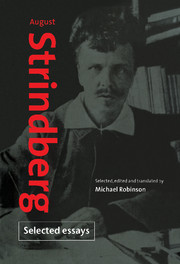Book contents
- Frontmatter
- Contents
- Notes on the text
- Introduction
- from Vivisections (1887)
- ‘The Battle of the Brains’
- ‘Nemesis Divina’
- ‘Mysticism – For Now’
- ‘Soul Murder (Apropos Rosmersholm)’
- ‘On Modern Drama and Modern Theatre’ (1889)
- from Vivisections II (1894)
- ‘Césarine’ (1894)
- ‘Deranged Sensations’ (1894)
- ‘In the Cemetery’ (1896)
- from Jardin des Plantes (1896)
- ‘On the Action of Light in Photography’ (1896)
- ‘A Glance into Space’ (1896)
- ‘Edvard Munch's Exhibition’ (1896)
- ‘The Synthesis of Gold’ (1896)
- ‘Contemporary Gold-Making’ (1896)
- ‘The Sunflower’ (1896)
- ‘The Mysticism of World History’ (1903)
- ‘August Strindberg on Himself’ (1909)
- Notes and commentary
- Index
‘Nemesis Divina’
Published online by Cambridge University Press: 18 December 2009
- Frontmatter
- Contents
- Notes on the text
- Introduction
- from Vivisections (1887)
- ‘The Battle of the Brains’
- ‘Nemesis Divina’
- ‘Mysticism – For Now’
- ‘Soul Murder (Apropos Rosmersholm)’
- ‘On Modern Drama and Modern Theatre’ (1889)
- from Vivisections II (1894)
- ‘Césarine’ (1894)
- ‘Deranged Sensations’ (1894)
- ‘In the Cemetery’ (1896)
- from Jardin des Plantes (1896)
- ‘On the Action of Light in Photography’ (1896)
- ‘A Glance into Space’ (1896)
- ‘Edvard Munch's Exhibition’ (1896)
- ‘The Synthesis of Gold’ (1896)
- ‘Contemporary Gold-Making’ (1896)
- ‘The Sunflower’ (1896)
- ‘The Mysticism of World History’ (1903)
- ‘August Strindberg on Himself’ (1909)
- Notes and commentary
- Index
Summary
The celebrated botanist Linnaeus left a manuscript about Nemesis Divina from which extracts have only recently been published. From these it is evident that the great scientist believed in the direct intervention of a god in human destinies. He also believed that this same god already punishes criminals in this life, if only through the children in the third or fourth generations. In order to substantiate his theory of Nemesis he quoted a great number of cases, which he had observed in the course of a long life, and reading this data concerning the proceedings of this divine justice can hardly help but make a strong impression upon the reader.
Like every prominent personality who has long sought and finally attained an honourable place in life and then looks back in surprise over the difficulties he has overcome, Linnaeus also hit upon the idea that he was under a God's powerful and special protection. From this original premise he subsequently came to the conclusion that the same God who protected him must also ravage his enemies.
This belief, which is very widespread, must like everything else have a natural cause, even if the explanation is to be sought a little nearer home than where Linnaeus sought it. By way of experiment I would like to seek it in the very conditions of life, and in the fundamental nature of the human psyche.
A man who has reached the meridian of life, who has a wife and children, a position, and a fair prospect of supporting himself, finds this just as it should be; he may even be dissatisfied with his lot, and would have wished things better.
- Type
- Chapter
- Information
- August Strindberg: Selected Essays , pp. 47 - 55Publisher: Cambridge University PressPrint publication year: 1996



